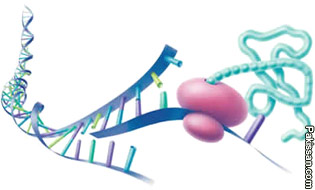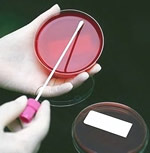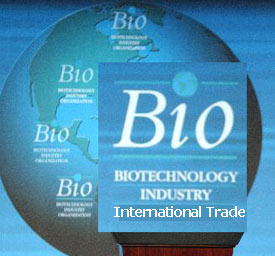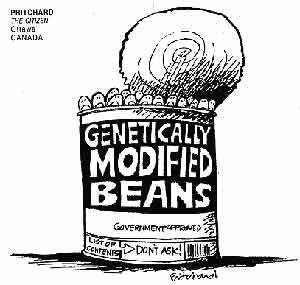|
Biosafety
protocol on international trade enter into force
Ijaz Ahmad Rao
The Cartagena Protocol on Biosafety is a protocol
under the Convention on Biological Diversity (CBD),
which was adopted in January 2000, enter into force on
11 September 2003. The aim of the protocol is to
control the trans-boundary movement of living
genetically modified organisms (LMOs) and the adverse
effects their release into the environment might have
on countries' ecosystems.
 The
protocol refers directly to the precautionary
principles, and establishes an advance informed
agreement (AIA) procedure for import of LMOs. A
biosafety clearing house will be used by parties to
exchange information, including on implementation
issues. The
protocol refers directly to the precautionary
principles, and establishes an advance informed
agreement (AIA) procedure for import of LMOs. A
biosafety clearing house will be used by parties to
exchange information, including on implementation
issues.
The protocol was opened for signature at the United
Nations Office at Nairobi by the US and regional
economic integration organizations from 15 to 26 May
2000, and remained open for signature at United
Nations Headquarters in New York till 4 June 2001. By
that date the protocol had received 103 signatures.
Pakistan has signed it on the 4 June 2001. Most of EU
countries, Asian, Latin American, African are Parties
to the Protocol, but United State has not ratified the
CBD.
With the development of science of biotechnology at
such a rapid pace, it is vital that developing
countries and countries with economies in transition
have the human resources and institutions they need
for promoting biosafety, therefore by building these
resources and strengthening international
collaboration on biosafety, the protocol will boost
public confidence and their ability to manage
genetically modified organisms (GMOs) safely.
Modern biotechnology promises to make a significant
contribution in enabling the development of, for
instance, better health care, enhanced food security
through sustainable agricultural practices, improve
supplies of potable water, more efficient industrial
development processes for transforming raw materials,
support for sustainable methods of a forestation, and
detoxification of hazardous wastes.
 Genetic
modification has already numerous scientific and some
commercial applications and is likely to be further
developed due to high expectations of its potential in
healthcare, agriculture, industrial production, and
environmental protection. There are, however, also
serious concerns about genetic modification. They
range from ethical considerations to potential risks
to human health and the environment, and encompass
also a number of socio-economic issues. These concerns
are heightened given the relatively small amount of
experience with the application of the technology to
date, and the fact that any adverse effects may only
be manifested over the long term. However, there isn't
a single documented case of an illness caused by foods
developed with biotechnology since they first came
into the market in the mid-90s. Therefore, a vigorous,
and often polarized, debate is taking place, centered
on potential risks and benefits of genetic
modification. Genetic
modification has already numerous scientific and some
commercial applications and is likely to be further
developed due to high expectations of its potential in
healthcare, agriculture, industrial production, and
environmental protection. There are, however, also
serious concerns about genetic modification. They
range from ethical considerations to potential risks
to human health and the environment, and encompass
also a number of socio-economic issues. These concerns
are heightened given the relatively small amount of
experience with the application of the technology to
date, and the fact that any adverse effects may only
be manifested over the long term. However, there isn't
a single documented case of an illness caused by foods
developed with biotechnology since they first came
into the market in the mid-90s. Therefore, a vigorous,
and often polarized, debate is taking place, centered
on potential risks and benefits of genetic
modification.
As a result of the debate, there have been increasing
policy discussions on how to regulate the application
of genetic modification techniques at the national
level and a number of national regulatory frameworks
have been established. As activities involving the
technology expanded, and in particular as actual and
potential commercial use increased, the scope of
national regulations tended to expand.
Designing frameworks for GMO regulations has not been
easy, as the main challenge was perceived to be
establishing an appropriate balance between
potentially important technological benefits and
appropriate environmental and human health safeguards.
 The
challenges of biosafety, in particular in the context
of the trans-boundary movement of GMOs, made an
international regime a prerequisite for an efficient
regulatory system, as biosafety cannot be achieved
without a coordinated approach between countries. This
is why the protocol has been developed and been
negotiated. The
challenges of biosafety, in particular in the context
of the trans-boundary movement of GMOs, made an
international regime a prerequisite for an efficient
regulatory system, as biosafety cannot be achieved
without a coordinated approach between countries. This
is why the protocol has been developed and been
negotiated.
The most contention area during the negotiations is
the relationship between the protocol and relevant
provisions in the WTO Agreements. Under the Agreements
of the WTO, Members are bound by certain obligations
that limit their right to restrict imports.
Any
country that joins the WTO automatically becomes a
party to a "package" of multilateral trade agreements,
including the General Agreement on Tariffs and Trade
1994 (GATT), the Agreement on the Application of
Sanitary and Phytosanitary Measures (SPS Agreement),
and the Agreement on Technical Barriers to Trade (TBT
Agreement). Therefore, on trade implications of the
Protocol avoiding potential conflicts between trade
laws and the biosafety regime will require good will
and careful management. So WTO members are in the
process of negotiating the relationship between
specific trade obligations in multilateral
environmental agreements such as the CBD, and WTO
rules.
Biosafety clearing-house
The protocol establishes a biosafety clearing-house as
part of the clearing-house mechanism. Its function is
to facilitate the exchange of scientific, technical,
environmental and legal information on, and experience
with, LMOs and to assist Parties to implement the
Protocol. It sets out certain categories of
information that parties are to make available to the
biosafety clearing-house.
Capacity-building
The protocol requires parties to co-operate in the
development and strengthening of human resources and
institutional capacities in biosafety in developing
country Parties, particularly least developed
countries such as Pakistan.
Capacity building has been recognized in many
international fora as the prime element that will
facilitate the effective implementation of any
biosafety regulations, guidelines, directives or any
future international agreements on biosafety. Efforts
in capacity building have been successful as evidenced
by number of Muslim countries like Indonesia and Egypt
who has adopted Bio-safety regulations long time ago.
Currently, UNEP-GEF and other organizations are
willing to provide financial and technical assistance
to prepare national biosafety guidelines, developing
capacity building in the area of scientific testing,
and monitoring and enforcement capabilities.
UNEP, with funding from the Global Environment
Facility (GEF), has embarked on a $39.4 million,
three-year, project to assist developing countries in
this area. Therefore, we must not lose this
opportunity by waiting to examine consequences of
bio-safety laws around the world. Otherwise we would
not be able to implement the Cartagena Protocol on
biosafety.
It is noteworthy that currently The European Union
have asked Pakistan to start labeling its products
specially agricultural, regardless whether it is
GMO-free or not. Unfortunately, Pakistan lags far
behind in the acquisition, application and management
of biotechnology. Much of the problem lies in the lack
of appropriate regulatory system. There is no
laboratory in Pakistan that can identify and properly
label which food products are genetically modified.
Unless a new laboratory is established, Pakistan may
loose agricultural exports amounting around $250
million per year to EU countries.
 Trans-boundary
movements Trans-boundary
movements
The Protocol requires Parties to adopt domestic
measures to prevent and penalize transboundary
movements of LMOs that occur in contravention of
domestic measures implementing the protocol. In the
case of such illegal movements, the affected party may
request the party of origin to dispose of the LMOs by
repatriation or destruction. The biosafety
clearing-house must be notified of all cases of
illegal transboundary movement.
Liability and redress
The question of liability and redress for any damage
caused by LMOs is another contentious issue in the
negotiations. It was not possible to resolve this
issue during the negotiations, and the protocol
requires the first meeting of the parties to the
protocol to adopt a process with respect to the
appropriate elaboration of international rules and
procedures for liability and redress for damage
arising out of the transboundary movements of LMOs.
This process is meant to be completed within four
years.
Conclusion
The Cartagena Protocol is an agreement that supports
trade in biotechnology products while at the same time
seeking to ensure that such trade is environmentally
safe.A basic starting point of the Protocol is market
access for producers, subject to ensuring the GMO's
are environmentally safe.The Protocol does not
prohibit trade in GMOs, and requires measures taken to
protect the environment to be the least trade
restrictive necessary for this purpose.
The environmental protection provisions of the
Protocol are undoubtedly the most advanced ever
included in an agreement that addresses market access
issues based on trade law principles or approaches. Of
critical importance for most SAARC countries and other
developing countries, they are significantly more
sensitive to the capacity building requirements of
states in order to be able to achieve appropriate
levels of protection.
Unfortunately, Pakistan is lagging far behind in the
acquisition, application and management of
biotechnology and its products. Much of the problem
lies in the lack of appropriate regulatory system like
biosafety guidelines, which are on the table of
Minister of Environment waiting for approval from last
three years. These guidelines would set up legal
requirements for import, export, develop, and release
into the environment the transgenic products resulting
from the technology. Science-based national biosafety
systems are important not only for the protection of
health and environment, but also to allow countries to
participate fully in world trade as defined under the
CBD Biosafety Protocol and the suite of agreements
which form the World Trade Organization.
Whether the Protocol reflects an environmental
agreement with very strong trade-oriented provisions
included, or a trade agreement with very strong
environmental provisions included is perhaps a matter
of perspective.More accurately, it may be a matter of
time to make such an assessment, until the next
implementing measures are taken and the regime is more
fully understood.What is certain, however, is that by
using specific WTO language and market access
principles in the text of the Protocol, combined with
specific international environmental law principles,
the negotiators have established a more specific
interaction of environmental protection and market
access to underlie the Protocol than seen previously.
There are challenges and opportunities for UNO, GEF
and USAID in assisting countries in developing,
implementing and enforcing biosafety systems based on
sound scientific principles. It is important for
Pakistan to put in place effective national biosafety
systems. The development of this system will benefit
the Pakistani producer in opening new markets for our
goods and services. Therefore, Pakistan must have its
biosafety regulations otherwise Pakistan is likely to
come under significant pressure to promote new WTO
disciplines soon. So in those circumstances we would
not be able to stop the trade of biotech products;
therefore, Pakistan must look after its future trade
market through activating Bio-safety regulations as
soon as possible either by adopting American model or
European model of regulations or even any third world
country's regulation.
|